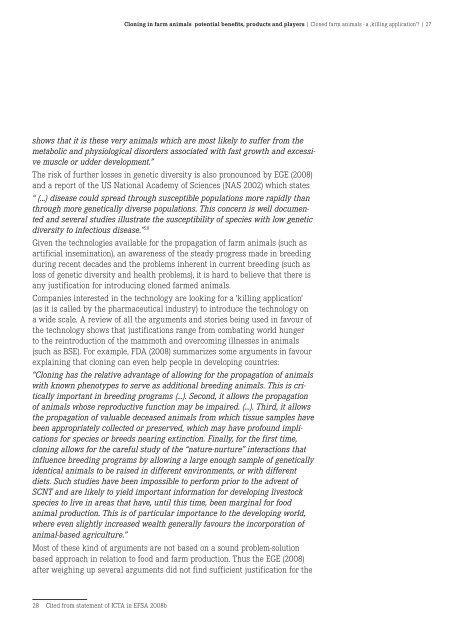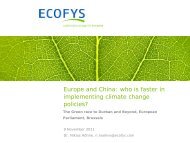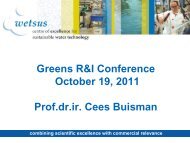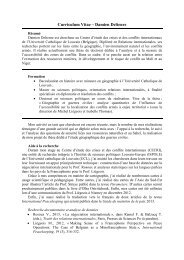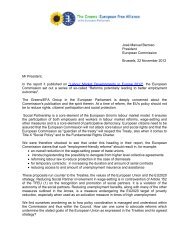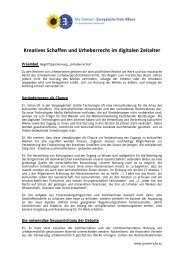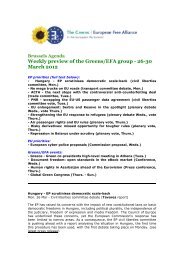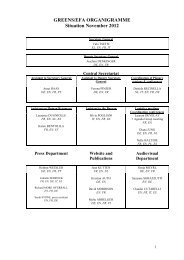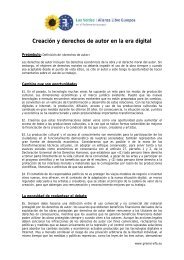Agro-Biotechnology: - The Greens | European Free Alliance
Agro-Biotechnology: - The Greens | European Free Alliance
Agro-Biotechnology: - The Greens | European Free Alliance
You also want an ePaper? Increase the reach of your titles
YUMPU automatically turns print PDFs into web optimized ePapers that Google loves.
Cloning in farm animals potential benefits, products and players | Cloned farm animals - a ‚killing application‘? | 27<br />
shows that it is these very animals which are most likely to suffer from the<br />
metabolic and physiological disorders associated with fast growth and excessive<br />
muscle or udder development.”<br />
<strong>The</strong> risk of further losses in genetic diversity is also pronounced by EGE (2008)<br />
and a report of the US National Academy of Sciences (NAS 2002) which states<br />
“ (...) disease could spread through susceptible populations more rapidly than<br />
through more genetically diverse populations. This concern is well documented<br />
and several studies illustrate the susceptibility of species with low genetic<br />
diversity to infectious disease.” 28<br />
Given the technologies available for the propagation of farm animals (such as<br />
artificial insemination), an awareness of the steady progress made in breeding<br />
during recent decades and the problems inherent in current breeding (such as<br />
loss of genetic diversity and health problems), it is hard to believe that there is<br />
any justification for introducing cloned farmed animals.<br />
Companies interested in the technology are looking for a 'killing application'<br />
(as it is called by the pharmaceutical industry) to introduce the technology on<br />
a wide scale. A review of all the arguments and stories being used in favour of<br />
the technology shows that justifications range from combating world hunger<br />
to the reintroduction of the mammoth and overcoming illnesses in animals<br />
(such as BSE). For example, FDA (2008) summarizes some arguments in favour<br />
explaining that cloning can even help people in developing countries:<br />
“Cloning has the relative advantage of allowing for the propagation of animals<br />
with known phenotypes to serve as additional breeding animals. This is critically<br />
important in breeding programs (...). Second, it allows the propagation<br />
of animals whose reproductive function may be impaired. (...). Third, it allows<br />
the propagation of valuable deceased animals from which tissue samples have<br />
been appropriately collected or preserved, which may have profound implications<br />
for species or breeds nearing extinction. Finally, for the first time,<br />
cloning allows for the careful study of the “nature-nurture” interactions that<br />
influence breeding programs by allowing a large enough sample of genetically<br />
identical animals to be raised in different environments, or with different<br />
diets. Such studies have been impossible to perform prior to the advent of<br />
SCNT and are likely to yield important information for developing livestock<br />
species to live in areas that have, until this time, been marginal for food<br />
animal production. This is of particular importance to the developing world,<br />
where even slightly increased wealth generally favours the incorporation of<br />
animal-based agriculture.”<br />
Most of these kind of arguments are not based on a sound problem-solution<br />
based approach in relation to food and farm production. Thus the EGE (2008)<br />
after weighing up several arguments did not find sufficient justification for the<br />
28 Cited from statement of ICTA in EFSA 2008b


